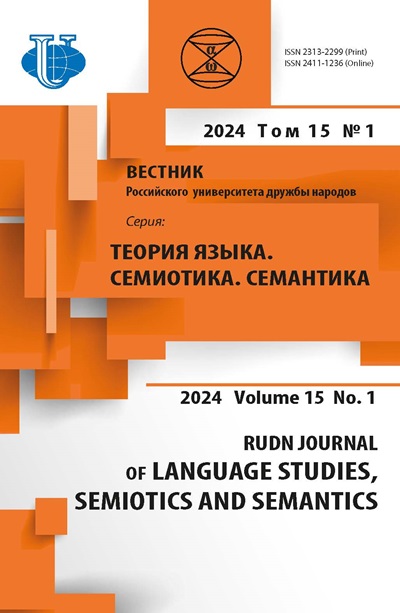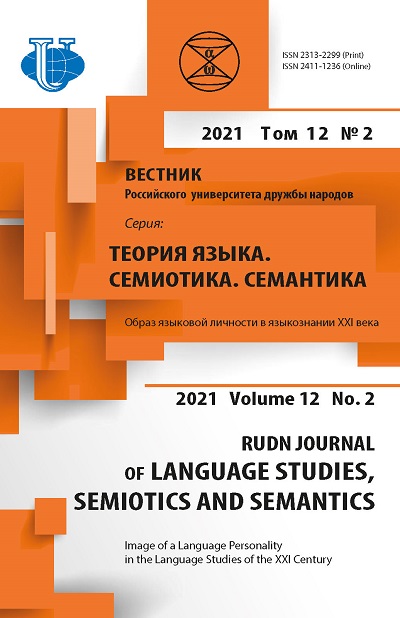National Identity and the Associative-Verbal Network: on a Hypothesis of Yu.N. Karaulov
- Authors: Ufimtseva N.V.1, Balyasnikova O.V.1,2
-
Affiliations:
- Institute of Linguistics, Russian Academy of Sciences
- Sechenov First Moscow State Medical University
- Issue: Vol 12, No 2 (2021): Image of a Language Personality in the Language Studies of the XXI Century
- Pages: 238-254
- Section: LANGUAGE PERSONALITY
- URL: https://journals.rudn.ru/semiotics-semantics/article/view/26745
- DOI: https://doi.org/10.22363/2313-2299-2021-12-2-238-254
Cite item
Full Text
Abstract
The article presents the results of the study dedicated to native speakers “sites of memory” associated with key images of the Russian national culture. The investigation was inspired by the work of French historians “Les lieus de mémoire” (1984), whose ideas Yuri Nikolayevich Karaulov applied to the Russian Associative Dictionary (RAD). The study was initiated with the hypothesis elaborated by Yu. N. Karaulov that the Russian national memory could be studied through associative dictionaries. This provision is based on the linguistic personality concept formulated by Yu. N. Karaulov that is regarded as a personality expressed in a language / text and can be reconstructed on the basis of linguistic means. The texts that a language personality produces reflect the peculiarities of a person’s vision of the environment (worldview). The hypothesis is tested on associative fields of the toponym Moscow and the lexemes war and Sunday using the data of several associative dictionaries compiled from 1988 to the current moment, i.e., the Russian Associative Dictionary, and Yu. N. Karaulov among the authors, as well as a number of later dictionaries developed on the basis of massive associative experiments carried out in the regions of Russia. The content and structural analyses of the associative fields of stimuli Moscow , war , and Sunday show that the associative material largely reflects the discursive space of the language personality and its functioning in texts that reproduce these “sites of memory” in a precedent form. The latter, however, can be found as various types of reactions (predications) of a non-stereotyped nature. Therefore, the sought-for data exist in different guises, obviously depending on the historical time and the discursive experience of native speakers of a language/culture, as well as on the region of their residence. This study confirms the psycholinguistic concept of meaning (including the associative one) as a sociocultural phenomenon.
About the authors
Natalya V. Ufimtseva
Institute of Linguistics, Russian Academy of Sciences
Author for correspondence.
Email: nufimtseva@iling-ran.ru
PhD of Philological Sciences, Professor, Chief Researcher, Head of the Department of Ethnopsycholinguistics, Institute of Linguistics RAS
1, Bolshoy Kislovskiy per., Moscow, Russian Federation, 125009Olga V. Balyasnikova
Institute of Linguistics, Russian Academy of Sciences; Sechenov First Moscow State Medical University
Email: o.balyasnikova@iling-ran.ru
PhD of Philological Sciences, Senior Researcher, Department of Ethnopsycholinguistics, Institute of Linguistics RAS; Associate Professor, Department of Linguistics and Intercultural Communication, I.M. Sechenov First Moscow State Medical University
1, Bolshoy Kislovskiy per., Moscow, Russian Federation, 125009; 8-2 Trubetskaya St., Moscow, Russian Federation, 119991References
- Karaulov, Yu.N. (1989). Russian language personality and the tasks of its study In Yazy’k i lichnost’. Moscow: Nauka. pp. 3—8. (In Russ.).
- Chulkina, N.L. (2020). Creative Language Personality of the Scientist-Humanitarian Georgi Gechev. Journal of Psycholinguistics, 3(45), 153—168. doi: 10.30982/2077-5911-2020-45-3-153-168. (In Russ.).
- Krasnykh, V.V. (2020). Archaic Layers of Consciousness of a Modern Linguistic Personality (A Case Study of the Basic Metaphor Liquid). Journal of Psycholinguistics, 3(45), 70—84. doi: 10.30982/2077-5911-2020-45-3-70-84. (In Russ.).
- Karaulov, Yu.N. (1999). Active Grammar and the Associative-Verbal Network. Moscow: IRYa RAN. (In Russ.).
- RAS: Russian Associative Dictionary (2002). Yu.N. Karaulov, G.A. Cherkasova, N.V. Ufimceva, Yu.A. Sorokin & E.F. Tarasov (eds.). Vol. 1. Ot stimula k reakcii. Ros. akad. nauk. Moscow: AST: Astrel’. (In Russ.).
- Buxarkin, P.E. (2014). «Russian Idea» in Russian Literature. Saint-Petersburg: SPbPDA. (In Russ.).
- Shaposhnikov, L.E. (1996) The Philosophy of Sobornost’: Essays on Russian Self-Consciousness. Saint-Petersburg: Izd-vo Sankt-Peterburgskogo un-ta. (In Russ.).
- Troiczkij, E.S. (1994). About the Russian Idea: essays on the theory of the rebirth of the nation. Moscow. (In Russ.).
- Pestreczov, A.F. Sobornost, constant of the Russian national identity. Vestnik Nizhegorodskogo universiteta im. N.I. Lobacheskogo, 1(9), 176—181. (In Russ.).
- Les lieus de mémoire (1984). Sous la direction de Pierre Nora. Vol. 1. La Republique. Paris: Gallimard. (In Franch).
- Leont’ev, A.A. (1976). Semantic Aspect of Language Meaning In Principy’ i metody’ semanticheskix issledovanij. Moscow: Nauka, pp. 46—73. (In Russ.).
- Ufimceva, N.V. (2016). Language Worldview: Modeling Problems. Journal of Psycholinguistics, 1, 238—249. (In Russ.).
- EVRAS: Ufimceva, N.V. & Cherkasova, G.A. Russian Associative Dictionary-Thesaurus EVRAS. In 2 vols. Vol. 1. From stimulus to reaction. Moscow. (In Russ.).
- SIBAS: Shaposhnikova I.V., Romanenko A.A. Russian Regional Associative Dictionary. Siberia and the Far East. In 2 vols. Vol.1. From stimulus to reaction. M.: Moskovskij institut lingvistiki. Moscow, 2014 (In Russ.).
- KrAS: Crimean Associative Dictionary (2020). (In Russ.).
- SANRYa: Dictionary of associative norms of the Russian language (1977). A.А. Leont’ev (ed.). Moscow: Izd-vo Mosk. un-ta. (In Russ.).













